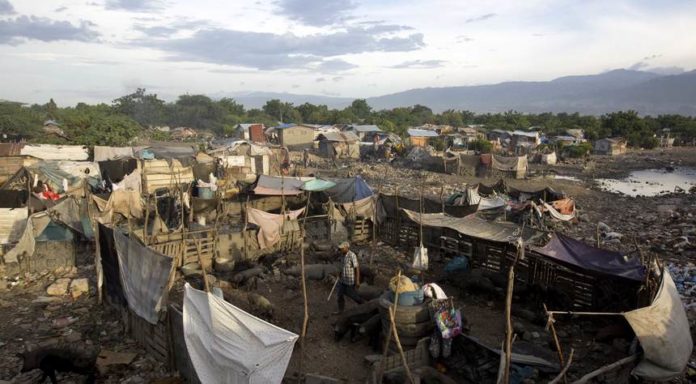The Biden administration would like to see troops in Haiti. The U.S. troops are not the ones we want, but our allies. Concern over a mass immigration event where people flee the destruction and decay in the country is the impetus.
Fox News reports that the government forces have been successful against the gangs but that many troops fear being out on the streets of Port-au-Prince or other cities. A devastating situation that was already in dire straits has been made worse by the 2021 earthquake and assassination attempt on President Jovenel Moise. The gangs have grown bolder and more powerful since Moise’s murder. There is a concern that a perfect storm could develop that will lead to mass migration to the United States. Already, Haitian immigrants are crossing the southern border.
Natalie Kitroeff, a New York Times journalist, wrote that the number in Haiti of immigrants has quadrupled in the last year. Former U.S. special representative to Haiti, Daniel Foote told Kitroeff that “that has always been the U.S. government’s biggest Haitian nightmare, which is a mass migration event. It’s here; the next step will be biblical with people falling from any floating object. We’re not far from it.”
Kitroeff stated that the Haitian government requested military assistance last month in order to restore order. She also included a quote by Ban Ki-moon who was secretary general during the period that the U.N. had a presence in Haiti. Ki-moon stated that the country’s trust was destroyed due to a cholera epidemic brought on by troops. Also, Insight Crime reported in 2011 that the U.N.’s Haiti term was characterized as “forever destroyed” because of concerns about the agency’s security forces’ connections to organized crime. The site Political Violence At A Glance also featured a 2018 article on the troubling connection between human trafficking, and U.N. forces.
Kitroeff also wrote that the country is currently facing a severe food shortage and poverty in addition to violence and poverty. Biden’s administration estimated that at most, 2,500 military personnel or law enforcement personnel would need to open major arteries. However, no other countries have expressed an interest in participating.
My wife and I went on a mission trip to Haiti with a group of people from our church years ago. It was a standard church mission trip. The group bagged rice and handed out food. They also performed skits and sang songs and moved gravel around to build a new project. We did the exact same thing as the next church group that arrived a week later. The “construction” project should have been a paid job that went to locals. We didn’t accomplish much overall. However, we did get our spiritual endorphins.
It is difficult to find adequate words to describe the poverty levels in this country. The United States does not realize how dire the situation has been over so many years. While some people can make a living from homes of cinderblock and others have to live in garbage-filled structures or stick-tied buildings, many Americans don’t realize how desperate things have been for so many years. There are many crimes, including drug trafficking and other criminal acts. One time, we saw a corpse lying on the street. Only the most obstinate missionaries will leave the group or compound unsupervised.
One time, I was riding in a pickup truck with several mission workers. They mocked people who packed excessive amounts of goods or passengers on a motorbike or had to assemble a variety of parts to transport material, parcels, and even water. To survive in third-world countries, you need to be resourceful and smart. The United States does not have the resources, ingenuity, or skills to help a country fail.
The United Nations was a constant presence overall. It was a busy time on the roads, with many motorcades. I was also told that the UN did little to hinder traffic.
We visited an island village in the center of a large lake near Fond Parisien. We went to drop off spaghetti, vegetable oil, and rice to the locals. We also handed out water bags and snacks to the children. I saw several boats in military style loaded with soldiers heading our way when we arrived on shore. A contingent of UN military forces emerged from the boats as they landed. They were all from Brazil, and each one looked in their early teens or early twenties. Although they were friendly enough, they wanted to know our names, whereabouts, and what we were up to. They took photos of each of them. Did I mention that they were fully equipped with the most recently automatic weapons? We were eventually able to communicate with them and we were allowed to go about our daily business.
The United States and other countries have sent money, assistance, and even guns to Haiti. Individuals and private groups, as well as NGOs, have made the pilgrimage to make a difference by providing medical care, education, and food. Despite all this, Haiti’s situation has not improved. It appears, in fact, that things have gone terribly sour.
It is time to stop viewing Haiti as a source for virtue signaling, or as a place to be occupied to benefit its residents. Haiti’s problems likely began at the top. They will not be solved by snack boxes or truckloads full of international soldiers. If this were true, then things wouldn’t be so dire. Citizens should be able to find solutions at both the bottom and the middle of the problem. In that regard, NGOs and church groups could play a part in encouraging that, and, in due time, returning home.
The problem with the government must be resolved immediately. While a military presence is necessary for the short term, there are other issues that must be addressed if Haiti is to have a bright future.
Cui bono is a key question. Who benefits from the situation in Haiti?




